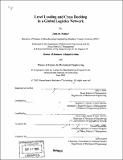Level loading and cross docking in a global logistics network
Author(s)
Palmer, John M. (John Michael)
DownloadFull printable version (5.813Mb)
Other Contributors
Leaders for Manufacturing Program.
Advisor
Stephen C. Graves and David Edgar Hardt.
Terms of use
Metadata
Show full item recordAbstract
There are various reasons why companies manufacture their goods in different areas of the world. These reasons include: lower labor costs, emerging markets, tax and tariff considerations, and intellectual property issues. With the constant pressure to decrease costs, outsourcing is becoming more popular, especially to areas having very low labor costs, such as Asia. As a result of the longer distances needed to ship product, logistics is becoming a much larger part of the cost of goods. The global nature of some businesses also requires long supply chains. This globalization requires firms to manufacture their goods and provide their services throughout the world. The logistics systems can affect the supply chain and operations in many ways. In order to have the lowest overall cost, companies must consider tradeoffs among various cost drivers. Inventory policies and operations might have to be altered to accommodate increased logistical needs. Today, the many details involved in the logistics network have created new sets of problems that have not been as important to firms in the past. This thesis looks at examples of cross docking and leveling as means to reduce the overall supply chain costs in a global logistics network and applying them at Eastman Kodak Company. This thesis is the result of work done during a 6.5 month LFM internship at Eastman Kodak Company in Rochester, New York. In order to protect company confidentiality, the data has been altered or disguised.
Description
Thesis (M.B.A.)--Massachusetts Institute of Technology, Sloan School of Management; and, (S.M.)--Massachusetts Institute of Technology, Dept. of Mechanical Engineering; in conjunction with the Leaders for Manufacturing Program at MIT, 2005. Includes bibliographical references (p. 60).
Date issued
2005Department
Leaders for Manufacturing Program at MIT; Massachusetts Institute of Technology. Department of Mechanical Engineering; Sloan School of ManagementPublisher
Massachusetts Institute of Technology
Keywords
Sloan School of Management., Mechanical Engineering., Leaders for Manufacturing Program.